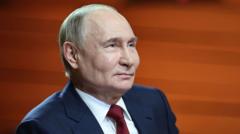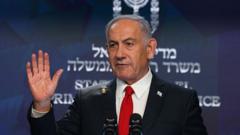A significant diplomatic crisis unfolds as Israel faces mounting condemnation from western allies and the silence of Donald Trump amid urgent humanitarian concerns in Gaza.
**Diplomatic Storm Brews Around Israel as Trump Stays Silent**

**Diplomatic Storm Brews Around Israel as Trump Stays Silent**
Tensions escalate as Israel confronts international backlash while Trump refrains from commentary.
Israel is currently navigating a turbulent diplomatic landscape, marked by increasing international condemnation over its military operations in Gaza. This week has been particularly tumultuous, illustrated by a stark headline from Ha'aretz warning of a "diplomatic tsunami" as European nations vocally disapprove of what they describe as Israel’s "complete madness" amidst an escalating humanitarian crisis in Gaza.
The flurry of negative responses began on Monday, when a joint statement was issued by the governments of the UK, France, and Canada, condemning Israel's military actions as "egregious" and emphasizing a possible progression to "targeted sanctions" should Israel not alleviate humanitarian restrictions. Following this statement, 24 donor nations expressed their outrage over a newly proposed model for aid delivery to Gaza, which has sparked further discontent.
The repercussions of this diplomatic offensive have been swift, with the UK halting trade negotiations with Israel and reevaluating a previously agreed roadmap for cooperation. Sanctions targeting Jewish settlers followed, aimed at notable figures within the community. Perhaps most striking was Britain's summoning of Israeli ambassador Tzipi Hotovely to the Foreign Office, a protocol typically reserved for more adversarial states.
The gravity of the situation was underscored by the tragic murders of two Israeli embassy employees in Washington, which some Israeli officials have sought to link to the rising tide of international criticism against the country. This assertion, however, has drawn skepticism both at home and abroad.
UK Foreign Secretary David Lammy condemned the statements made by Israeli officials, labeling them as "extremism" and calling for accountability. This sentiment was echoed by British Prime Minister Sir Keir Starmer, who, facing internal party pressure, expressed a strong disappointment towards the suffering of children in Gaza—a significant shift for him given his history as a staunch defender of Israeli actions.
Israel’s Prime Minister Benjamin Netanyahu has reacted vehemently to the growing diplomatic storm, accusing western allies of siding with terrorism. In response to the backlash, Israeli authorities are increasingly finding themselves isolated on the world stage, with even prominent figures from the Jewish diaspora voicing their concerns about the conflict and advocating for humanitarian intervention.
However, through this whirlwind of diplomatic alterations, one notable figure remains largely silent: former President Donald Trump. Despite recent frustrations expressed by White House officials regarding the ongoing situation, Trump has not publicly addressed these developments, leaving a void amidst the escalating international tensions. His silence stands in sharp contrast to the urgency and vocal disapproval being echoed by global leaders, raising questions about the current administration's stance on the crisis in Gaza and Israel’s actions.
The flurry of negative responses began on Monday, when a joint statement was issued by the governments of the UK, France, and Canada, condemning Israel's military actions as "egregious" and emphasizing a possible progression to "targeted sanctions" should Israel not alleviate humanitarian restrictions. Following this statement, 24 donor nations expressed their outrage over a newly proposed model for aid delivery to Gaza, which has sparked further discontent.
The repercussions of this diplomatic offensive have been swift, with the UK halting trade negotiations with Israel and reevaluating a previously agreed roadmap for cooperation. Sanctions targeting Jewish settlers followed, aimed at notable figures within the community. Perhaps most striking was Britain's summoning of Israeli ambassador Tzipi Hotovely to the Foreign Office, a protocol typically reserved for more adversarial states.
The gravity of the situation was underscored by the tragic murders of two Israeli embassy employees in Washington, which some Israeli officials have sought to link to the rising tide of international criticism against the country. This assertion, however, has drawn skepticism both at home and abroad.
UK Foreign Secretary David Lammy condemned the statements made by Israeli officials, labeling them as "extremism" and calling for accountability. This sentiment was echoed by British Prime Minister Sir Keir Starmer, who, facing internal party pressure, expressed a strong disappointment towards the suffering of children in Gaza—a significant shift for him given his history as a staunch defender of Israeli actions.
Israel’s Prime Minister Benjamin Netanyahu has reacted vehemently to the growing diplomatic storm, accusing western allies of siding with terrorism. In response to the backlash, Israeli authorities are increasingly finding themselves isolated on the world stage, with even prominent figures from the Jewish diaspora voicing their concerns about the conflict and advocating for humanitarian intervention.
However, through this whirlwind of diplomatic alterations, one notable figure remains largely silent: former President Donald Trump. Despite recent frustrations expressed by White House officials regarding the ongoing situation, Trump has not publicly addressed these developments, leaving a void amidst the escalating international tensions. His silence stands in sharp contrast to the urgency and vocal disapproval being echoed by global leaders, raising questions about the current administration's stance on the crisis in Gaza and Israel’s actions.





















